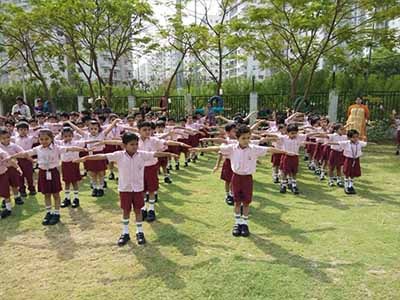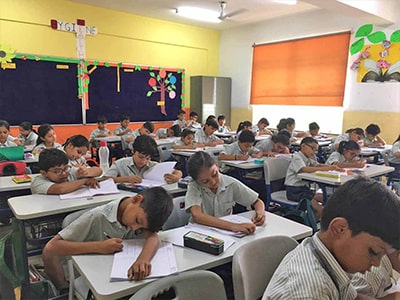Download our FREE Academic Calendar now! 📚 Start your child’s journey to success.
We, as parents, are always looking to find the best school for our children, monitoring their actions, checking their progress, planning their future careers and helping them make informed life decisions. In a child’s life, parental guidance plays an essential part in shaping their success and destiny.
It has a key role in the child’s education and academics, shaping their character, arming them with confidence, and safeguarding their well-being. All young and brilliant minds need the right care, focus, and direction of parents as leaders, to attain the child’s learning potential and success.
Hence, it is the responsibility of every parent to understand and provide complete support to the child to realise their child’s learning potential and contribute to their growth and success.
Teachers always stress the importance of parental involvement, which doesn’t simply mean being their homework monitors. Parents are at the forefront of developing a child’s confidence, character, motivation and responsibility when it comes to schoolwork.
These factors contribute to the child’s academic and personal welfare. If anything, education is teamwork involving the parents, teacher, students, and society. The detachment of even one of those members will derail the student’s education.
As a parent, you might be quite supportive and involved in your child’s activities.
Few Tips to Boost Your Child’s Even Higher Learning Potential
1. Don’t Just Chase A’s
What is a learning potential? A child should be encouraged to give their best in everything they do. However, we need to accept that their best wouldn’t always get them an A. We need to understand and be willing to accept that it is alright.
For most parents, letting go and appreciating their child’s uniqueness is very difficult in the prevalent culture of success-worship and standard testing education system.
A child is not naturally created to do everything, and we were designed as individuals with unique abilities. Your child will do exceedingly well in some subjects while needing help with others.
2. Encouragement And Commendation
As humans, we seek appreciation and praise for our efforts. For children, the feedback that they have done a job well enough is reassurance and motivation for them to try aiming at that level again.
If a child is to do well at school, they need that self-belief, the confidence to believe they are valuable, loved and accepted, irrespective of what the report card proclaims. This message needs to be reinforced over and over again.
3. Create Teaching Opportunities Out of Everyday Experiences
Everyday situations and routines can be practical opportunities for improving their learning potential and education. The child should be encouraged to ask questions.
Instead of providing readymade answers to their queries, help them probe and find the answers. Work with them to find solutions that will encourage a curious mind that seeks knowledge.
Teachers are always coming up with different tricks and ideas to help their students in the classroom. Parents can tap into the teachers’ knowledge to take some tips on how to help the children. If parents use the same methods that teachers do, it will reinforce the learning in the child.
4. Encourage the Reading Habit
How do you motivate children to learn in school? An overwhelming number of teachers agree that one of the most vital things you can do for your child’s success at school is to read to them at home. Reading is the key to a child’s success in school, and it starts at home with parents, who are their first teachers.
When we say read, it doesn’t just mean to read out monotonous passages from books. Use the time and opportunity to encourage the children to ask questions and discuss the stories. That way, the children will learn a lot about choices and consequences.
It also paves the way to introduce the child to suitable heroes. Read biographies together, pausing at historical points, reciting stories of courage, devotion and character.
5. Let the Child Succeed – And Experience Failure – On Their Own
Your tending instincts can tempt you to take control of the child’s schoolwork, but we need to be aware of the consequences. Students become successful when they learn to be responsible, reliable and organised by trying repeatedly.
Sometimes, the failures we encounter can be our best teachers. Parents who complete the children’s work for them are depriving the child of the practice they need, the act of owning their work, and the extreme satisfaction of completing an assignment responsibly.
6. Ensure the Basics to the Child
Ensure the child receives adequate sleep, nutrition, proper hygiene, and necessary medical care. Studies show that children who have a healthy breakfast before school experience improved academic activities and enhanced concentration and cognitive functioning.
7. Communicate With Your Child’s Teacher Regularly
A regular communication channel between the parents and teachers is valuable in monitoring a child’s education and learning potential. Parents should try to gain from the teacher’s knowledge and ask questions such as, “How can I improve my child’s learning?”
If you are a working professional, schedule a convenient time for both of you, and attend conferences arranged by the schools whenever possible. If your child’s teacher is willing to share, you might also get their email address and phone number for regular communication.
8. Know What the Child Is Learning at School
Flip through the child’s assignment book, ask about their classroom discussions, look at the textbooks, and talk to teachers. You could also ask the teachers if you can help out in the classrooms, from time to time.
This would allow you to observe your child’s fares in an academic and social situation and, at the same time, assist the teacher too.
9. How Do You Motivate Children to Learn in School?
To encourage your child to make the correct choices, help them pick the choices because they want to do their best, not due to the fear of punishment. The difficulty lies in teaching children to choose the good instead of forcing them to choose by fearing punishment or disenchantment.
These will be invaluable lessons to children even in school and later in life because it nurtures a craving for excellence in everything they do. The children will thus have an interest in learning, not just to earn a grade or please a parent.
10. Inculcate Discipline and Respect at Home
Many teachers agree that disobedience and disrespect are constant problems in the classroom. Many parents think that their child’s disciplinary issues will be straightened out at school, who are expected to handle the discipline.
However, discipline is something that should be reinforced primarily at home. If children do not act a certain way at home, they will most certainly not act that way when they come to their classroom.
Also, talk about respect and display it at home through your actions – in your marriage, relations, friendships, work, and even when it concerns the children. Often, students don’t show respect at school because they don’t have enough self-respect or don’t get the deserved respect at home.
11. Offer Rewards & Motivations
Children are motivated to do their schoolwork and study if offered rewards. The offer of a fun activity or their favourite toy if they complete all their homework and studies is a simple incentive to keep the children motivated.
To boost the child’s learning education, you can use various incentives, such as watching their favourite cartoons, playing a game or going out to play with friends.
Conclusion
Every child is unique, and their learning potentials are different. However, it doesn’t mean their potential cannot be improved upon. The involvement of parents in the child’s development is invaluable and necessary for improving the child’s overall personality, from their character to learning abilities.
GIIS is one of the best international schools in Ahmedabad, known for its innovative approach towards education and academic excellence.
The school believes in motivating their students and helps students to explore their strengths and in turn increase their self-confidence. It is an award-winning school with a world-class campus and outstanding infrastructure and amenities.





































